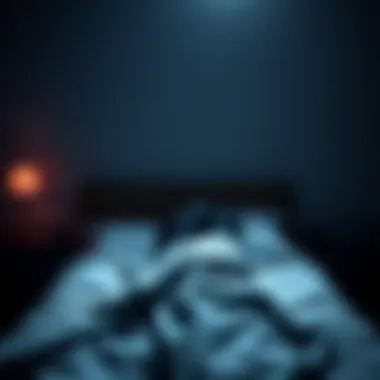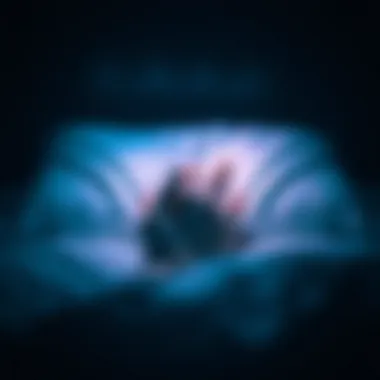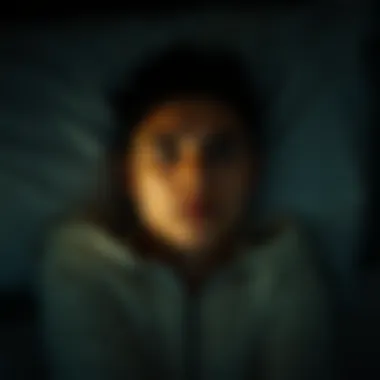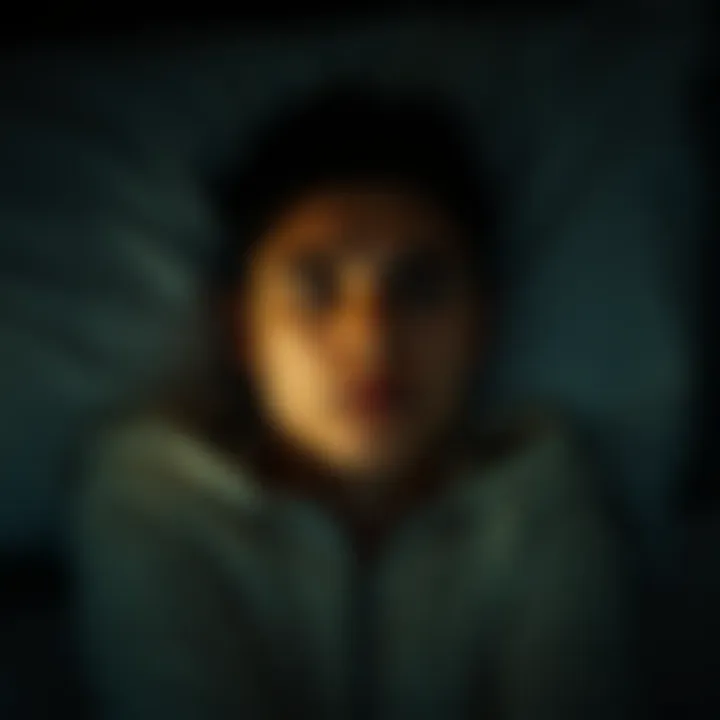Understanding the Link Between Insomnia and Depression


Intro
The interplay between sleep disturbances and mood disorders has captured the attention of psychologists and medical professionals for decades. Insomnia, defined as difficulty falling or staying asleep, is not just an inconvenience; it can be a significant indicator of underlying mental health issues, most notably depression. The connection between these two conditions is complex and multifaceted, as multiple research studies show that one often exacerbates the other.
Understanding this relationship is crucial, not only for those who suffer from these conditions but also for healthcare providers tasked with developing effective treatment plans. The symptoms of insomnia can compound the experience of depression, leading to a concerning cycle that can affect overall vitality and quality of life.
Research Highlights
Key Findings
Recent studies have shed light on several key findings regarding the connection between insomnia and depression:
- More than half of individuals diagnosed with depression report experiencing insomnia. This statistic indicates that insomnia isn't just a side effect; it can be a pronounced symptom of deeper emotional struggles.
- Sleep disruption may influence how depression manifests in an individual, potentially altering response to conventional treatments.
- According to the American Psychological Association, chronic insomnia can increase the risk of developing mood disorders like depression.
"Sleep is the golden chain that ties health and our bodies together." - Thomas Dekker
These findings emphasize the necessity of recognizing insomnia not merely as a sleep issue but as an essential element in the overall understanding of mental health.
Implications and Applications
The implications of this research stretch far beyond academic curiosity. For clinicians, understanding the nuances in presenting symptoms of insomnia and depression has substantial impacts on treatment approaches:
- Integrated Treatment: Treatments should address both depression and sleep disturbances simultaneously. Cognitive Behavioral Therapy for Insomnia (CBT-I) has shown promise in helping patients improve their sleep and mood.
- Early Intervention: Identifying insomnia patterns can allow for earlier intervention in at-risk populations, preventing the onset of depression.
- Tailored Approaches: Individualized treatment plans that account for a patient’s specific sleep patterns and mood states can lead to more effective outcomes.
Methodology Overview
Research Design
The relationship between insomnia and depression has been explored through various methodologies. Researchers commonly employ longitudinal studies, allowing them to observe how sleep patterns affect mood over time. This type of study highlights the temporal relationship between the two conditions.
Experimental Procedures
Utilizing a combination of self-reported questionnaires and clinical assessments allows researchers to gather data from diverse populations. In particular, studies often include instruments such as:
- The Pittsburgh Sleep Quality Index (PSQI) to evaluate sleep quality.
- The Beck Depression Inventory (BDI) to assess depression levels.
By collecting detailed information, researchers can draw more precise correlations between insomnia symptoms and depressive episodes, paving the way for future research and treatment developments.
Preamble
The intricate relationship between insomnia and depression is not just a matter of sleepless nights or a passing bout of the blues. The growing body of research indicates a profound overlap between these two states, where one often exacerbates the other in a relentless cycle. This article aims to shed light on the nuances of how sleep disturbances may serve as a precursor or symptom of depressive disorders. Understanding this connection is vital for several reasons.
Firstly, addressing insomnia can lead to significant improvements in overall mental health. If clinicians and patients recognize insomnia not just as a nuisance but as an indicator of potential psychological issues, interventions can be tailored more effectively. Secondly, this connection can foster deeper awareness and empathy in society towards those affected by both conditions. By grasping the realities of sleeplessness and its psychological toll, we may reduce stigmas that often accompany mental illness.
In examining this topic, we will delve into several critical aspects including statistical insights, cohort studies on sleep patterns, and the underlying psychological mechanisms linking insomnia and depression. This multifaceted approach aims to enhance our understanding of how the dynamics of sleep affect mood and vice versa, ultimately contributing to more integrated treatment methodologies that encompass both sleep issues and mood disorders.
> "There’s no doubt sleep is integral to our psychological well-being and functioning."
This narrative is not merely about identifying problems but also about exploring viable solutions and therapeutic strategies that can make a tangible difference in people’s lives. Accordingly, we will break down the phenomena of insomnia and depression into their respective definitions to set the groundwork for our discussions in the following sections.
The Prevalence of Insomnia in Depressed Individuals
Understanding the prevalence of insomnia within depressed individuals is crucial to grasping the broader narrative of mental health. The intersection between poor sleep patterns and depressive disorders reveals much about how these two conditions feed off each other, forming a cyclical relationship that can be challenging to break. Addressing the prevalence of insomnia allows clinicians and researchers to appreciate the scope of the issue and the severity it brings to those already grappling with mental health challenges. Both conditions can exacerbate one another, creating a vicious cycle that’s hard to escape.
Statistical Insights
Multiple studies have camera obscura of alarming statistics regarding how widespread insomnia is among those with depression. For instance, the American Psychiatric Association notes that nearly 90% of individuals diagnosed with depression report having trouble sleeping. This figure is staggering and indicative of a commonality that extends well beyond mere inconvenience.
- A meta-analysis revealed that approximately 70% of patients suffering from major depressive disorder also experience some form of insomnia.
- In longitudinal studies, researchers found that individuals with persistent insomnia symptoms face a nearly 30% increased risk of developing depressive episodes over time.


The correlation we see in these statistics is not just numbers; they represent people whose quality of life is significantly affected. The situation is exacerbated by certain demographic factors: women, for example, often report higher instances of insomnia compared to men, particularly those who are also fighting depression. It also has implications for age, with older adults often finding sleep disruptions to be more frequent.
Cohort Studies on Sleep Patterns
Cohort studies examining sleep patterns have further illuminated this connection. Research typically follows a group of subjects over time, observing how sleep issues intertwine with mental health outcomes. These studies have posited that inadequate sleep often precedes the onset of depression, suggesting a potential predictive element.
- For instance, cohort research involving young adults showed that students experiencing sleep deprivation one semester had a higher incidence of depressive symptoms the following term.
- Another study focusing on a cohort aged 50 and above found that those reporting insomnia two years earlier had elevated depressive symptoms at the follow-up, reinforcing the belief that disrupted sleep can act as a precursor to more severe mental health problems.
"If one doesn't sleep well, the mind cannot rest; similarly, if the mind is troubled, sleep becomes elusive."
These insights are significant, emphasizing the need for awareness about the dual nature of insomnia and depression. The patterns observed here serve as a call to action for both clinical practitioners and researchers. They underscore a pressing need to address sleep disturbances among depressed individuals not just to alleviate insomnia but also as a means to combat depressive symptoms effectively. The clearer we become on these interrelations, the more successful we can be in administering treatment and support.
Psychological Mechanisms Linking the Two
Understanding the mechanisms that link insomnia and depression is not merely an academic exercise; rather it illuminates the heart of how sleep disruptions can exacerbate or even precipitate mental health issues. Recognizing these interconnections enables clinicians to tailor more effective treatment plans and also guides individuals towards proactive steps for their well-being. Addressing the psychological mechanisms provides a clearer picture of the interplay between these two afflictions, laying groundwork for integrated approaches to treatment.
Cortisol and Stress Response
Cortisol is often dubbed the
Clinical Implications of Insomnia in Depression
Understanding the clinical implications of insomnia in relation to depression offers vital insights into both diagnosis and treatment frameworks. Insomnia is not merely a nuisance; it can often serve as a flag indicating deeper underlying issues, particularly depressive disorders. This section aims to elucidate the multifaceted connections between these two conditions, how they affect each other, and why addressing them is crucial for overall mental health.
Insomnia is frequently one of the first symptoms to emerge in individuals with depression. When patients present with sleep disturbances, clinicians must consider insomnia as a pivotal element in the broader context of mental health. This intersection is critical for accurate and timely diagnosis. Adequate management of both conditions is necessary to enhance the quality of life and prevent potential deterioration.
Diagnosis Challenges
The diagnostic process surrounding insomnia and depression is notably intricate. Given that both disorders can manifest similarly, distinguishing one from the other can be akin to navigating a maze. Healthcare professionals often face the challenge of discerning whether insomnia is a primary concern in a patient's symptoms or merely a byproduct of depression.
- Overlap of Symptoms: Symptoms of insomnia—such as fatigue, mood swings, and difficulty concentrating—can overlap significantly with those of depression. This can lead to misdiagnosis or underdiagnosis, complicating treatment plans.
- Timing and Duration: Assessing the timing and duration of sleep issues is essential. If insomnia precedes depressive symptoms, it may indicate a different therapeutic approach compared to cases where insomnia develops after depression has become pronounced.
- Need for Comprehensive Evaluation: An effective diagnosis often necessitates a comprehensive evaluation which includes sleep studies, patient history, and possibly psychological assessments. Clinicians must not jump to conclusions and must scrutinize all aspects of the patient's condition, recognizing that every individual's experience with sleep and mood disorders can vary.
The diagnostic hurdles can impede effective treatment, putting a spotlight on the immediate need for healthcare providers to adopt a multidisciplinary approach that involves psychiatrists, psychologists, and sleep specialists.
Treatment Overlap: Sleep and Mood Disorders
The interplay between insomnia and depression continues to present interesting challenges and opportunities in terms of treatment. There is an undeniable overlap in how both disorders can be treated, yet understanding this convergence can enhance therapeutic outcomes.
- Pharmacological Treatments: Many medications, such as selective serotonin reuptake inhibitors (SSRIs) and sleep aids, often serve dual purposes, addressing both mood stabilization and sleep regulation. Recognition of this overlap can prevent the need for separate prescriptions.
- Psychotherapeutic Approaches: Techniques like Cognitive Behavioral Therapy (CBT) have shown efficacy in treating both insomnia and depression. Tailoring these treatments to address both issues can yield more comprehensive results compared to treating each condition in isolation.
- Lifestyle Modifications: Behavioral interventions that focus on sleep hygiene, regular physical activity, and dietary changes can also benefit both conditions. Small adjustments in daily routine—like reduced caffeine intake or establishing bedtime rituals—can improve sleep quality while lifting mood.
Despite the shared pathways in treatment options, it’s essential to approach each case with a level of individualized care. What works for one person may not yield the same results for another.
It's crucial that mental health professionals recognize these clinical implications—addressing both insomnia and depression holistically not only improves individual outcomes but also enriches our understanding of the complex relationship between sleep and mental health.
Treatment Modalities
Treatment modalities for insomnia and depression make up the crux of understanding how to effectively manage these interconnected issues. Since both insomnia and depression can exacerbate each other, addressing them simultaneously is crucial. Treatment approaches must be tailored to individual needs, taking into account personal history, severity of symptoms, and the effectiveness of past interventions. This understanding informs caregivers, patients, and researchers about available options that could lead to better outcomes and improved quality of life.
Pharmacological Approaches
When considering pharmacological options, medications play a significant role in the treatment of both insomnia and depression. Antidepressants such as fluoxetine or sertraline not only help address symptoms of depression but can also improve sleep patterns. Conversely, some sleep medications may carry the risk of dependence or side effects that interfere with mood stabilization.
Key points to remember about these medications include:
- Dual Action: Certain drugs, like trazodone, target both sleep and mood, providing a two-pronged approach to treatment.
- Side Effects: Each medication comes with its own set of side effects that need careful consideration. Weight gain or drowsiness could potentially worsen depressive symptoms or overall well-being.
- Monitoring: Ongoing assessment is essential to adjust medications as needed. Finding the right balance can take time, and reliance on prescribed drugs should be part of a comprehensive treatment strategy.
Psychotherapy Options
Psychotherapy offers various approaches to manage insomnia and depression, with the focus on enhancing coping mechanisms and addressing root causes rather than solely treating symptoms. Treatments such as Cognitive Behavioral Therapy (CBT) and mindfulness techniques have gained traction in recent years. Their appeal lies in their adaptability and emphasis on patient engagement.


Cognitive Behavioral Therapy for Insomnia
Cognitive Behavioral Therapy for Insomnia (CBT-I) focuses on addressing the thoughts and behaviors that contribute to sleep disturbances. This therapy helps patients reframe their mindset about sleep, reducing anxiety and fostering better sleep hygiene.
Key characteristics of CBT-I include:
- Cognitive Techniques: Identifying negative sleep thoughts and replacing them with more constructive ones.
- Behavioral Modifications: Encouraging habits that promote better sleep, such as maintaining a consistent sleep schedule.
CBT-I is well-regarded due to its measurable effectiveness. Studies have shown it to be a beneficial choice, particularly for individuals who prefer to avoid medication or those seeking long-term solutions. However, it does require a commitment to the process and can take several weeks to achieve significant results.
Mindfulness and Sleep
Mindfulness practices, such as meditation or controlled breathing exercises, have emerged as a contemporary method of addressing insomnia and depression. By fostering a sense of awareness and acceptance, mindfulness aids patients in managing their thoughts and stress levels, ultimately improving sleep quality.
Key characteristics of mindfulness include:
- Stress Reduction: Learning to observe thoughts without judgment can help alleviate the anxiety that often accompanies insomnia.
- Flexibility: Mindfulness can be integrated into daily routines, making it accessible for many individuals.
Although mindfulness offers numerous benefits such as increased relaxation and enhanced mood stability, some might find it challenging to adopt these practices consistently. Finding the right approach depends on the individual, and what works well for one person may not resonate with another.
Combining these approaches not only tackles symptoms but also supports building resilience and improving overall well-being in the long run. By integrating both pharmacological and psychotherapeutic modalities, patients can work toward a more holistic resolution to their insomnia and depressive symptoms.
For more information on these treatment options, consider visiting resources such as the National Institutes of Health or American Psychological Association.
Lifestyle Factors Affecting Sleep and Mood
The interplay between lifestyle factors and mental health conditions like insomnia and depression is both intricate and significant. This article zeroes in on how what we eat, how we exercise, and our sleeping habits can influence our mood and overall well-being. These elements are not just collateral; they are crucial components that can either support or hinder recovery processes in individuals grappling with sleep disturbances or depressive symptoms.
Dietary Influences
The adage "you are what you eat" holds a kernel of truth, particularly when discussing mental health. A balanced diet contributes not only to physical health but is pivotal for cognitive functioning and emotional stability. Numerous studies suggest that diets rich in essential nutrients, such as Omega-3 fatty acids, antioxidants, vitamins, and minerals, can positively affect mood. For instance, fish like salmon and nuts can boost serotonin levels, a neurotransmitter linked directly to mood regulation.
Moreover, processed foods high in sugar and unhealthy fats are often associated with increased inflammation in the body, which has been connected to depressive symptoms. Individuals often find that by adjusting their diets to include more fruits, vegetables, and whole grains — while avoiding excessive sugars and refined carbs — they experience an improvement in both sleep quality and mood.
- Essential Nutrients:
- Omega-3 Fatty Acids
- Antioxidants
- Vitamins
Exercise and Its Impact
The role of exercise in promoting better sleep and mood cannot be understated. Engaging in regular physical activity acts like a natural antidote to insomnia and depressive feelings. A brisk walk, jogging, or even yoga can help reduce cortisol levels, the hormone often linked with stress, while increasing the levels of endorphins, commonly known as feel-good hormones.
Studies reveal that individuals who incorporate regular exercise routines report enhanced sleep quality, reduced insomnia symptoms, and even a decrease in the severity of depression. The key lies in finding activities that one enjoys rather than adhering to a punishing regime; this ensures higher compliance and more persistent benefits. Additionally, exercising outdoors can expose individuals to natural light, which is another key factor in regulating sleep-wake cycles.
- Benefits of Exercise:
- Reduces Stress
- Enhances Sleep Quality
- Boosts Mood via Endorphin Release
Sleep Hygiene Practices
Establishing good sleep hygiene is an often-overlooked aspect that can significantly affect both sleep and mood. Poor sleep habits can exacerbate depressive symptoms, making it crucial to cultivate a sleep-friendly environment. Consider the following practices:
- Consistent Sleep Schedule: Going to bed and waking up at the same time every day helps regulate the body's internal clock.
- Comfortable Sleep Environment: Ensuring the bedroom is dark, quiet, and at a comfortable temperature sets the stage for better rest.
- Limit Screen Time: Reducing exposure to screens before bedtime helps prevent disruptions to melatonin production, a hormone that signals the body it's time to sleep.
- Relaxation Techniques: Techniques like deep breathing, meditation or gentle stretching can subconsciously signal to the body that it's time to wind down.
Practicing good sleep hygiene is like giving a helping hand to your body; it encourages you to embrace rest and rejuvenation more effectively.
Combining these elements into one’s daily routine may not come without challenges. Such changes often require diligence and personal commitment. However, recognizing the importance of lifestyle factors in managing insomnia and depression provides a practical foundation for individuals seeking improvement in their mental health. Acknowledging and tackling these lifestyle elements can pave the way for significant strides toward recovery.
Case Studies and Real-World Examples


Understanding the intricate link between insomnia and depression requires not just theoretical insights but also real-world narratives that illuminate these connections. Case studies play a vital role in this exploration by offering concrete examples of how these conditions manifest in individuals. They help to shed light on the nuances that statistics alone cannot capture. When we delve into patient stories, we can observe how insomnia weaves itself into everyday life, impacting relationships, work, and overall well-being. This personalized approach allows for a deeper comprehension of both disorders. It’s one thing to read about correlations in a research paper, and another to hear how someone navigates their sleep struggles alongside feelings of hopelessness. The human aspect can often bring data to life in a way that’s deeply relatable.
These narratives can also serve as valuable tools in clinical practice. They not only highlight the common symptoms that might be overlooked but also emphasize the importance of a holistic view when treating such interconnected ailments. Additionally, they foster empathy and understanding among healthcare providers, reminding them of the real lives behind the statistics.
Patient Narratives
Patient narratives offer a unique perspective that often highlights the complex interplay of insomnia and depression. Consider the case of Jessica, a freelance graphic designer in her early thirties. Jessica has struggled with insomnia since her teenage years but always attributed her sleeplessness to her hectic work schedule. Over time, she noticed that her sleep issues worsened whenever she felt emotionally drained or overwhelmed. Her nights became a battleground, filled with racing thoughts and the inability to switch off.
After reaching out for help, Jessica was diagnosed with depression—a diagnosis she hadn’t considered. Learning about the relationship between her sleepless nights and her mental health brought clarity. She realized that her nighttime awakenings were not merely a consequence of her sideline projects; they were closely tied to her emotional state, locked in a vicious cycle. The profound sense of isolation during long sleepless nights deepened her depressive feelings, making it a double-edged sword.
Jessica’s story is far from isolated. Many patients recount similar experiences where sleep disruptions coincide with emotional turmoils, highlighting the need for awareness and proper diagnosis. These narratives underscore the critical importance of addressing both sleep and mood disorders in treatment plans.
Clinical Trials Overview
The relevance of real-world examples extends into the realm of clinical trials, where findings from studies provide a scientific backbone to these personal experiences. Numerous clinical trials have sought to explore the effectiveness of different treatments for insomnia and depression, providing evidence and insights that shape current practices. For instance, a recent study published in the Journal of Clinical Psychology evaluated the effects of Cognitive Behavioral Therapy (CBT) specifically tailored for individuals facing both insomnia and depression. The trial reported impressive results, showing significant improvements in sleep quality and mood stability for participants, suggesting that integrated treatment modalities can yield the best outcomes.
This underscores the urgent need for more longitudinal studies focusing on the bidirectional relationship between the two disorders. When researchers observe and document these connections, it adds weight to the argument that insomnia can both exacerbate and perpetuate depression, thus requiring careful consideration when developing treatment plans.
In summary, both patient narratives and clinical trials highlight the multifaceted relationship between insomnia and depression, providing valuable insights that can inform future research directions and therapeutic interventions. These examples not only enrich our understanding but also pave the way for more effective strategies in managing these intertwined conditions.
Future Directions in Research
As we navigate the complexities surrounding insomnia and depression, it's essential to spotlight future directions in research. This topic plays a pivotal role in shaping our understanding of the intricate relationship between sleep and mental health. By investigating new pathways, we can develop innovative treatment options and bolster our knowledge about these commonly coexisting issues. Research conducted with a multidisciplinary approach can yield insights that transcend traditional boundaries, influencing psychology, psychiatry, and sleep medicine.
Innovative Treatment Approaches
The area of innovative treatment approaches is promising. Exploring methods such as behavioral interventions combined with pharmacological treatments offers a fascinating avenue. For instance, integrating sensory stimulation through aromatherapy or light therapy with cognitive behavioral therapy could yield substantial benefits. Recent evidence suggests that integrating technology—such as apps that guide users through relaxation techniques—may reduce insomnia symptoms and improve mood.
Some other innovative approaches include:
- Virtual reality therapy that places individuals in calming environments, potentially easing anxiety that fuels both insomnia and depression.
- Sleep-promoting diets, which focus on incorporating nutrients that enhance sleep quality.
- Biofeedback training, helping individuals gain control over physiological functions that affect sleep.
"Innovative treatment options could well bridge the gap between managing insomnia and alleviating depression, ultimately improving quality of life for many."
Longitudinal Studies on Insomnia and Depression
Longitudinal studies are crucial for grasping the enduring nature of insomnia and its impact over time on depression. By following participants across years, researchers can glean valuable insights into how sleep disturbances may precede or exacerbate depressive episodes. Such studies have the potential to identify not only correlations but also causal relationships, which are imperative for crafting effective interventions.
Some significant areas of focus in future longitudinal studies may encompass:
- The trajectory of sleep quality over time in relation to mood fluctuations.
- Identification of risk factors that predispose individuals to both conditions.
- The effectiveness of early interventions, examining how timely treatment of insomnia can reduce the onset of depression or mitigate its severity.
For further insights, you may check resources such as National Institute of Mental Health or American Academy of Sleep Medicine.
Finale
The connection between insomnia and depression is a multifaceted issues that intertwines our understanding of mental health and sleep. This article has journeyed through various aspects of both conditions, illuminating how sleep disturbances can be indicators of deeper emotional turmoil.
Summarizing Key Findings
A clear thread runs through the evidence presented: insomnia is not simply a nuisance but often a symptom intertwined with depressive disorders. For instance, studies repeatedly show that individuals suffering from depression frequently experience disrupted sleep patterns. Data suggests that this disruption contributes to exacerbating depressive symptoms, creating a perpetual cycle. Furthermore, psychological mechanisms such as heightened cortisol levels and altered neurotransmitter activity have been outlined as pivotal in linking these two conditions.
Key findings include:
- Insomnia often presents itself before depression symptoms do, pointing to its role as a potential early warning sign.
- The quality of sleep significantly affects the capacity for mood regulation, making improved sleep a viable target for treatment.
- Research indicates that populations with a high incidence of insomnia show a correlating spike in depressive disorders.
In essence, understanding this intricate relationship is vital for effective diagnosis and treatment, which leads us to our next point.
The Importance of Integrated Treatment
Recognizing the relationship between insomnia and depression underscores the need for integrated treatment approaches. This dual focus on both sleep improvement and mood stabilization presents more comprehensive care, enhancing overall health outcomes. Treatment strategies that address sleep hygiene alongside psychotherapeutic interventions are paramount.
Integrated treatment plans might include:
- Cognitive Behavioral Therapy for Insomnia (CBT-I), which has proven effective in treating sleep issues while simultaneously addressing underlying depressive symptoms.
- Mindfulness practices, which enhance awareness and relaxation, play a dual role in enhancing sleep quality as well as alleviating stress and anxiety that often accompany depression.
- Pharmacologic interventions that target both sleep and mood should not be overlooked; medications that address one condition often impact the other positively.
Ultimately, the aim is to develop a treatment ecosystem that acknowledges and treats both insomnia and depression concurrently. As research continues to evolve, the importance of this interconnected approach becomes increasingly apparent, paving the way towards better mental health understanding and management.



